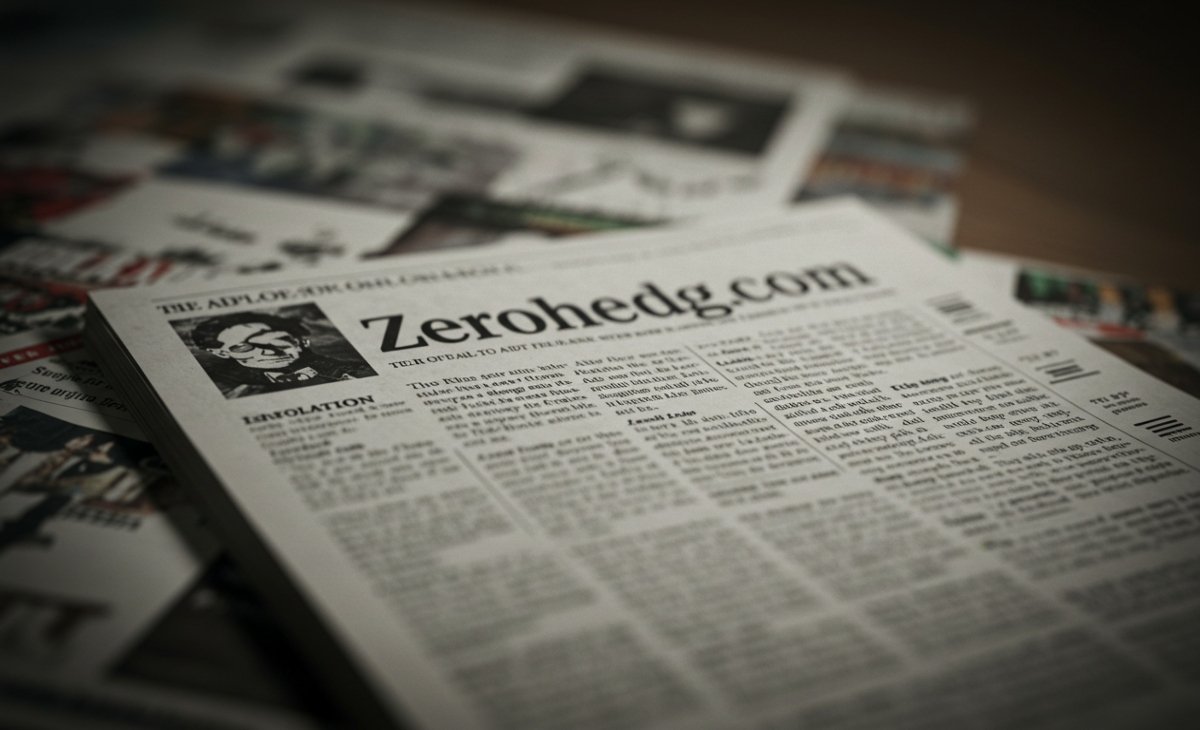News
zerohedge.com: Unpacking the Controversial Financial Blog

Have you ever stumbled upon a website that makes you stop and think, “What exactly is this place?” For many, zerohedge.com is that kind of site. It’s not your typical news outlet or financial blog. Instead, it’s an online space that mixes deep dives into money matters with strong opinions on politics, often stirring up quite a bit of debate. This article will help you understand what zerohedge.com is all about, how it works, and why it has become such a talked-about platform in the world of online information.
The “Tyler Durden” Mystery: Who is Behind zerohedge.com?
One of the most intriguing things about zerohedge.com is its main author: “Tyler Durden.” If that name sounds familiar, it’s because it comes from the famous movie Fight Club. In the film, Tyler Durden is a character who challenges the system and encourages people to think differently. This choice of a pen name isn’t just a fun detail; it perfectly captures the spirit of zerohedge.com. The site’s motto, “On a long enough timeline, the survival rate for everyone drops to zero,” also comes from Fight Club, hinting at a generally pessimistic view of the world.
So, who is the real “Tyler Durden”? It’s actually a group of writers, but the site’s owner, Daniel Ivandjiiski, is known to be one of them. The website explains that using an anonymous name is a way to “responsibly, truthfully deliver the news” and to “push back against the oppression of knowledge”. They believe that in today’s world, where many media outlets might be influenced by political views. Its anonymity helps them speak freely without fear of being silenced. However, this anonymity also means that individual writers aren’t directly accountable for everything published, which has led to some concerns, especially when controversial or unproven claims are made.
You Might Also Like: Fintechzoom.com Stoxx 600
This unique approach to authorship helps zerohedge.com build a strong brand. Readers aren’t following individual journalists; they’re following “Tyler Durden,” who represents the site’s overall anti-establishment viewpoint. This consistent voice helps create a sense of community among its readers. Its making the content feel familiar and trustworthy to its target audience, even as the topics jump from finance to politics or even conspiracy theories.
ZeroHedge’s Financial Worldview: The “Permabear” Stance
At its heart, zerohedge.com started as a financial blog, and money matters remain a big part of what it covers. But it’s not just any financial site; it has a very specific way of looking at the economy. The site is often called a “financial permabear”. Think of a “permabear” as someone who almost always expects the stock market or economy to go down, even when others are feeling positive. This outlook comes from a strong belief in something called the Austrian School of economics.
In simple terms, the Austrian School of economics believes that economic ups and downs are mostly caused by “credit cycles”—how much money is being borrowed and lent. They also think that when central banks (like the U.S. Federal Reserve) try to boost the economy by printing more money or buying bonds (a process called “quantitative easing” or QE). It only creates a temporary, artificial boost to prices. Because of this view, zerohedge.com often suggests that people should invest in things outside the traditional banking system. Its like precious metals (gold and silver) and cryptocurrencies, as a way to protect their money. They are also strongly against Keynesian economics, which is a different way of thinking about how governments can manage the economy.
Beyond these core beliefs, zerohedge.com frequently discusses various theories about how markets are supposedly manipulated. For example, they talk about “high-frequency trading” (HFT) and “dark pools,” suggesting that big investment banks use these to unfairly control prices. They also claim that the prices of precious metals are manipulated. Another popular theory on the site is the idea of a “Plunge-Protection Team” (PPT). Which suggests that central banks step in almost daily to stop markets from falling too much. Furthermore, they’ve discussed beliefs that U.S. banks know about these secret PPT trades ahead of time. That market liquidity (how easily things can be bought and sold) is fake. That Chinese economic data is made up (“fraudcaps”), and that even house prices are manipulated to stimulate the economy.
Beyond Finance: zerohedge.com’s Shift to Politics and Controversy
Over time, zerohedge.com didn’t just stick to finance. It expanded its reach significantly, diving deep into political topics and often promoting views that are considered far-right, alt-right, and even pro-Russia. This shift wasn’t random; their initial anti-establishment financial views naturally led them to question mainstream politics, media, and even scientific ideas.
For instance, the site has a noticeable pro-Russia bias, and U.S. intelligence officials have even claimed that zerohedge.com has amplified Russian propaganda by publishing articles from Russian state-run media. They often criticize U.S. foreign policy, for example, suggesting that the U.S. was trying to create panic about Ukraine. Headlines on the site can be very direct, like “Zelensky Boasts Of ‘Absolutely Brilliant’ Longest Range Strikes While Kremlin Confirms ‘Terrorist Attacks'”. They also cover U.S. domestic politics, often criticizing figures like President Biden and discussing former President Trump. The site also frequently expresses skepticism about mainstream media, with headlines like “YoU DoN’T HaTe MaiNSTReaM MeDiA ENouGH!”.
A significant part of zerohedge.com’s non-financial content involves conspiracy theories and fringe rhetoric. During the COVID-19 pandemic, for example, the site was an early platform for misinformation, including unproven theories linking a Chinese scientist to the outbreak or suggesting the virus was a bioweapon. They have also touched on controversial ideas like “white genocide” or “white replacement” conspiracy theories. This consistent focus on distrust across finance, politics, and social issues helps them keep a loyal audience that is already skeptical of official stories.
The site’s approach is to offer a “critical analysis of prevailing narratives” and to “liberate oppressed knowledge”. This means they often present information that goes against what you might hear from mainstream news, positioning themselves as an alternative source of truth. This unique perspective, while sometimes leading to “dubious” financial analysis , is what attracts their specific readership.
Platform Bans and Reputation: The Challenges Faced by zerohedge.com
Because of its controversial content, zerohedge.com has faced significant challenges, including bans and criticisms from major online platforms. These incidents highlight the ongoing debate about free speech, misinformation, and content moderation in the digital age.
One notable instance was when Google banned zerohedge.com from its advertising platform in June 2020. Google stated that the site violated its content policy against “derogatory content that promotes hatred, intolerance, violence or discrimination based on race”. This ban was specifically linked to comments found in stories about the Black Lives Matter protests. This shows that even if the main articles are carefully worded, the comments section can still cause problems for a site.
Social media platforms have also taken action against zerohedge.com. Twitter temporarily suspended the site’s account in February 2020 after it published an article promoting a conspiracy theory that a Chinese scientist was responsible for the coronavirus outbreak. The article reportedly shared the scientist’s personal information, which violated Twitter’s rules against abuse and harassment. Although Twitter later reinstated the account, admitting it “made an error”. The incident underscored the site’s willingness to publish highly controversial and unverified claims. Facebook also temporarily blocked users from sharing zerohedge.com links in 2019, though this ban was also reversed, with Facebook calling it a “mistake”.
These bans and suspensions, while impacting the site’s ability to earn money from ads and its reach on social media, haven’t stopped its growth. In fact, its readership has “skyrocketed”. This suggests that for its target audience, the shock value and the confirmation of their existing beliefs are more powerful than mainstream acceptance or factual accuracy. The site’s continued publication of controversial content, despite these restrictions, indicates a strategic choice to maintain its unique. Its often provocative, voice and its connection with its audience, possibly valuing this over traditional revenue streams.
Why People Read zerohedge.com: Audience and Influence
Despite, or perhaps because of, its controversial nature, zerohedge.com has built a dedicated following. Its appeal lies in its ability to connect with a specific audience that feels underserved or misrepresented by mainstream media.
The site’s core appeal is its anti-establishment stance. Many readers are drawn to its skeptical view of Wall Street, central banks, and government policies. They feel that zerohedge.com is one of the few places willing to “unmask the malodorous bile that emanates from the Wall Street Spin Machines”. This resonates deeply with individuals who distrust official narratives and seek alternative explanations for financial and political events.
The site has successfully carved out a niche audience. This includes financial traders and others interested in deep, often critical, analysis of markets. However, it has also attracted a “second audience” by expanding into alt-right and pro-Russia political views. This dual appeal—combining financial analysis with conspiracy theories—is unique and has allowed zerohedge.com to create a loyal online community. Readers often engage actively in the comments sections, which, as we saw, can be so intense that they even led to Google’s ad ban.
The influence of zerohedge.com comes from its ability to be an early amplifier of certain narratives. For example, it was instrumental in bringing the topic of high-frequency trading to public attention. It also played a significant role in spreading unproven theories about the COVID-19 pandemic. While critics might call its financial analysis “dubious” or its content “tinfoil-hat conjecture” , its readership has grown substantially. This shows that for its target audience, the value lies not necessarily in predictive accuracy, but in a narrative that validates their worldview and distrust of official sources.
Navigating Online Information: Lessons from zerohedge.com
The existence and popularity of zerohedge.com offer important lessons about how we consume information in today’s digital world. In an age where anyone can publish anything online. It’s more important than ever to be a smart and critical reader.
One key takeaway is the rise of media skepticism. Many people are increasingly questioning the news they consume, and sites like zerohedge.com tap into this distrust by offering “alternative narratives”. They position themselves as sources of “oppressed knowledge,” appealing to those who feel that mainstream media isn’t telling the whole story. This highlights the need for all of us to develop strong critical thinking skills. Instead of simply accepting what we read, we should ask questions: Who is writing this? What are their biases? What evidence do they provide? Is this information supported by other reliable sources?
Understanding different information sources is also crucial. Just as zerohedge.com blends detailed financial research with speculative theories, many online platforms mix facts with opinions, and sometimes even misinformation. Learning to tell the difference between these types of content is a vital skill. This means looking beyond sensational headlines and digging deeper into the sources and evidence presented.
For example, when zerohedge.com publishes “detailed research from Wall Street investment banks” , it might seem highly credible. However, it’s important to consider how that research is framed and what conclusions the site draws from it. Especially when those conclusions align with its “permabear” or conspiratorial views. This constant need for evaluation can be tiring, but it’s essential for forming a well-rounded understanding of complex issues.
Ultimately, sites like zerohedge.com remind us that the internet is a vast and varied landscape. It offers incredible access to information, but it also requires us to be active, thoughtful consumers of that information.
Conclusion: The Enduring Impact of zerohedge.com
zerohedge.com is more than just a financial blog; it’s a powerful and often controversial online platform that has carved out a unique space in the digital media landscape. It began with a focus on financial markets, driven by a “permabear” outlook and a belief in Austrian economics, often highlighting perceived market manipulations. Over time, it expanded its reach into political commentary, embracing far-right, alt-right, and pro-Russia viewpoints. Its becoming a notable amplifier of conspiracy theories, including those related to the COVID-19 pandemic.
The site’s use of the anonymous “Tyler Durden” persona and its consistent anti-establishment tone have helped it build a deeply loyal, albeit niche, audience that values its critical stance against mainstream narratives. This strategy has allowed zerohedge.com to thrive, even when facing bans from major platforms like Google, Twitter, and Facebook due to its controversial content and comments sections.
The story of zerohedge.com highlights several key takeaways about the modern information age. It shows how powerful a distinct brand and a consistent, albeit biased, viewpoint can be in attracting and retaining an audience. It also underscores the ongoing challenges of content moderation and the spread of misinformation online. As readers, it’s crucial to approach all online information, including that from zerohedge.com, with a critical eye. Always question sources, look for evidence, and consider different perspectives to form your own informed opinions. In a world overflowing with information, being a discerning consumer is perhaps the most valuable skill of all.

 Blog8 months ago
Blog8 months ago[PPT] Human Reproduction Class 12 Notes
- Blog8 months ago
Contribution of Indian Phycologists (4 Famous Algologist)
- Blog8 months ago
PG TRB Botany Study Material PDF Free Download

 Blog8 months ago
Blog8 months agoCell The Unit of Life Complete Notes | Class 11 & NEET Free Notes

 Blog8 months ago
Blog8 months ago[PPT] The living world Class 11 Notes

 Blog8 months ago
Blog8 months agoPlasma Membrane Structure and Functions | Free Biology Notes

 Blog8 months ago
Blog8 months agoJulus General Characteristics | Free Biology Notes

 Blog8 months ago
Blog8 months agoClassification of Algae By Fritsch (11 Classes of Algae)













